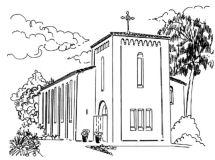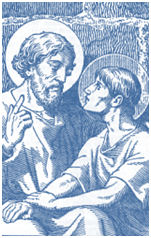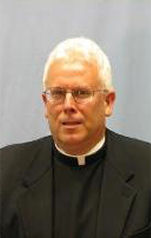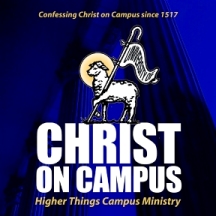Trinity Lutheran Church
Stanford Campus Ministry
Lutheran Student Fellowship / Christ on Campus

Trinity Lutheran Church (LCMS), Palo Alto, and
Christ on Campus / Lutheran Student Fellowship at Stanford
invite you to join us for our 2008 Spring Lecture Series:
Ancient Slavery
and the Modern Christian
A lecture series featuring
Concordia Theological Seminary, Fort Wayne, Indiana
April 11-13, 2008,
at Stanford University and Trinity Lutheran Church, Palo Alto
Onesimus and Paul. John Gilmary Shea, Little Pictorial Lives of the Saints
(New York: Benzinger Brothers, 1894).


The Apostle Paul, himself a Roman citizen, identified himself as a “slave of Christ” in his letters to congregations largely composed of slaves. His letters are in large measure couched in the language of Greco-Roman servitude—a cultural phenomenon far removed from antebellum American slavery. Paul even uses this language paradigmatically; all Christians are admonished to live as “slaves of God,” and to present their members as “slaves to righteousness.” Dr. Nordling will explain the cultural phenomenon of which Paul writes and the implications of his use of this metaphor for Christian doctrine and vocation.
The Rev. Dr. John G. Nordling is Associate Professor of Exegetical Theology at Concordia Theological Seminary, Fort Wayne, Indiana. He holds an M.A. in Classics from Washington University in St. Louis and a Ph.D. in Classics from the University of Wisconsin-Madison. From 1990-1994 he served as pastor at Grace English Ev. Lutheran Church in Chicago. Before accepting a teaching post at the Seminary in 2006, he taught the Classics at Valparaiso and Baylor Universities. He is the author of the 2004 Concordia Commentary on Philemon.
Session One
Friday, April 11, 7:00 p.m. – 9:00 p.m.
Stanford University (Room 105 in the Geology Corner of the Main Quad, Bldg. 320)*
We thank the Graduate InterVarsity Fellowship at Stanford for graciously allowing us the use of their usual Friday night room, and welcome their members to Dr. Nordling's talks.
Ancient Slavery vs. Modern Slavery
Biblical slavery should not be confused with modern, antebellum slavery in the American experience. In this session we will consider mosaics, statues, and frescoes depicting ancient slaves and several passages in the New Testament plainly indicating that large segments of the ancient epistolary audience were comprised of slaves.
Session Two
Saturday, April 12, 9:30 a.m. – 12:00 p.m.
Stanford University (Room 220 in the Geology Corner of the Main Quad, Bldg. 320)*
The Servility of Christ and the First Christians
Jesus’ death upon a cross struck a responsive chord with untold thousands of slaves over whom crucifixion hung like a dark pall in ancient society. In this session we will consider evidence suggesting that the New Testament was pitched to slaves and those of low social status, not merely elites. The Gospel was presented to the world as a bold invitation to anyone and everyone to become a “slave” of God in Christ by faith and Baptism, taking up one’s “cross” and following Jesus into a new life and destiny as a disciple of the Crucified One.
Session Three
Saturday, April 12, 1:00 p.m. – 3:00 p.m.
Stanford University (Room 220 in the Geology Corner of the Main Quad, Bldg. 320)*
Biblical Slavery as a Paradigm for Christian Vocation
Ancient slaves, like modern Christians, attended to a bewildering variety of jobs and duties in ancient society, inviting comparison to Luther’s doctrine of Christian vocation. In this session we will consider passages that suggest the relationship between masters and slaves in the New Testament and between Christians and persons of greater or lesser station in our world is essentially the same.
* For those parking at Stanford, please consider either the Oval (at the end of Palm Drive, just north of the Quad) or lot L-39 (the "Tressider Lot"), south of the Quad, off Mayfield Avenue (inside the Campus Drive loop). Both are indicated on this map.
Session Four
Sunday, April 13, 9:45 a.m. – 10:45 a.m.
Trinity Lutheran Church, 1295 Middlefield Road, Palo Alto
(You are welcome at the Divine Service at 8:15 or 11:00 a.m.)
Paul’s letter to Philemon
Written on behalf of Onesimus, a slave who ran away from Philemon and became as a son to Paul, one who found his usefulness to both Paul and Philemon in Christ, this succinct and beautiful letter beautifully portrays faith in action. In Paul’s repayment of Onesimus’ debt we see the image of Our Lord Christ’s payment for the sins of the world, and its manifestation in the lives of his servants. Dr. Nordling wrote Philemon for the Concordia Commentary, published by Concordia Publishing House in 2004.
Download a PDF Flyer about this event.
For further information, please contact:
Vicar John Sias
Trinity Lutheran Church
1295 Middlefield Road
Palo Alto, California, 94301
(650)853-1295
john.w.sias@gmail.com

